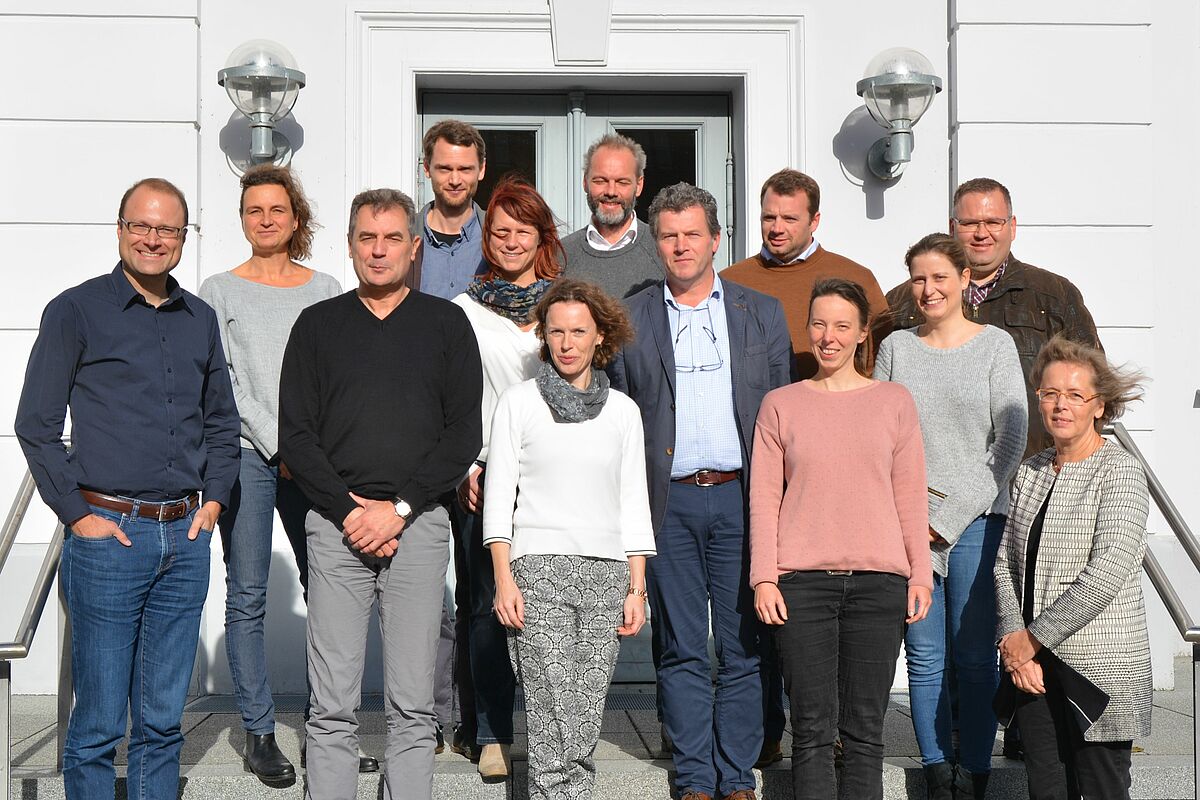Vorpommern Connect (VoCo) - Assessing and shaping sustainable urban-rural value chains
Project backround
The aim of the "Stadt-Land-Plus" funding measure is to achieve an integrated, sustainable development of regions by strengthening urban-rural relations. The VoCo project focuses on the University and Hanseatic City of Greifswald as a growing medium-sized centre in a rural region characterised by shrinkage. Greifswald and the Vorpommern region are thus representative of small urban growth centres in rural areas of Germany.
The university and Hanseatic city of Greifswald faces the challenge of ensuring a high quality of life and an adequate supply of public services for a growing city population and the population of the surrounding municipalities; for example, about 25% of the users of cultural and educational services in Greifswald already come from the surrounding area. Conversely, the surrounding countryside is becoming increasingly important as a recreational area for the urban population of Greifswald and neighbouring rural communities. In terms of sustainability, many are also calling for agriculture to become more environmentally conscious. This includes, in particular, the provision of regional products and the maintenance of the landscape.
In Vorpommern, these demands are met by a large-scale agricultural industry that currently supplies the majority of its agricultural products as raw materials to supra-regional markets. There is little value added in the processing and marketing of higher value products in the region. There is a lack of regional processing and marketing channels. Farmers are therefore mainly concerned with uncertain market developments and with adapting to changing rules and regulations regarding climate protection, the avoidance of nitrogen emissions and the promotion of biodiversity.
Sustainable land management must therefore pursue the productive and economic use of land without overlooking these different interests and interrelationships.
Aims of the project
VoCo aims to improve urban-rural relations between the Vorpommern region and the city of Greifswald, to reduce conflicts and to tap development potential. The aim is to create a comprehensive scientific basis for decisions on urban-rural relations. In detail, this will be done by (1) describing existing value chains and potentials for more sustainable land use, (2) defining objectives for multifunctional land use, and
(3) the further development of tools to assess scenarios for future land use developments, and (4) the identification of financing options for existing and innovative biodiversity and environmental services or environmental education.
In this approach, a selection of model projects in the region will be scientifically prepared and accompanied during their implementation. The projects are supported by practical partners in the neighbouring districts of Vorpommern-Rügen and Vorpommern-Greifswald as well as the University and Hanseatic City of Greifswald. The aim is to demonstrate new ways of using and adding value to raw materials, for example by increasing the value added in rural areas through regional processing, thus promoting stable regional development and increasing the benefits for the rural and urban population.
On the one hand, the focus is on the energetic use of raw materials from landscape conservation and paludiculture. In terms of climate protection, Greifswald aims to reduce its greenhouse gas emissions by 95% by 2050 compared to 1990 and to reduce final energy consumption by 50%. To this end, the potential for heat generation from renewable energy sources, such as grasslands in the surrounding area, has not yet been exploited. Many of these are currently being maintained at a subsidised minimum level, without making a significant contribution to value creation or biodiversity protection.
For other agricultural products, the focus will be on analysing value chains and the possibilities for greater regionalisation of value creation, as well as strengthening regional consumption or building regional brands.
The analyses will be based on consumer and expert surveys as well as systematic stakeholder and market analyses. With regard to ecological services in the landscape, detailed spatial analyses will be carried out and scenarios of alternative uses will be developed comparatively as a basis for discussion. Based on this, objectives for future development and suitable instruments, both administrative and financial, for achieving them will be developed and tested as far as possible in the regional partnership supported by the project participants.
At the same time, the development of urban-rural relations in the field of environmental education is an important starting point. In this way, the VoCo project, under the scientific direction of the University and with the participation of the Michael Succow Foundation for the coordination of the practical implementation with the regional partners in the city of Greifswald and the districts of Vorpommern-Greifswald and Vorpommern-Rügen, will successfully link up with already developed network processes such as the Greifswald Agricultural Initiative.
Title:
VoCo - Western Pomerania Connect- Assessment and Design of Sustainable Urban-Rural Value Chains
Funded by:
Funding measure "Stadt-Land-Plus" in the BMBF Framework Programme.
FONA3 "Research for Sustainable Development, funding Code: 033L211
Duration:
01.08.2018 to 30.09.2023
Network Coordinator
Prof. Volker Beckmann
Project Management
Dr. Michael Rühs (WP 9)
Further work packages (WP) at the chair:
- WP 3 Regional ecosystem services, financial instruments and institutions (Astrid Kowatsch)
- WP 5 Regional spatial integration of ecology and economy in scenarios (Stephan Busse)
Scientific partners:
- WP 1 Regional value chains of energy biomass (WG Moorkunde und Paläoökologie - Prof. Hans Joosten; University of Greifswald, Monika Hohlbein)
Economic and Social Geography - Prof. Daniel Schiller; University of Greifswald
- WP 2 Regional value chains of agricultural products and biofuels (Dr. Johannes Fuchs)
- WP 4 Regional demands of the population (Judith Maruschke)
Practical partners for pilot projects:
- WP 6 Regional balance of interests and stakeholder participation (Michael Succow Foundation, Thomas Beil)
- WP 7 Interface Management and Model Projects "Regional Supply" (University and Hanseatic City of Greifswald - Department of Economics and Finance)
- WP 8a Model projects "Rural places of experience and learning and teaching opportunities (District of Vorpommern-Greifswald - Department for Culture, Education and School Administration)
- WP 8b Pilot projects "(Supra)regional marketing" (District of Vorpommern-Rügen - Office for Economic Development)


